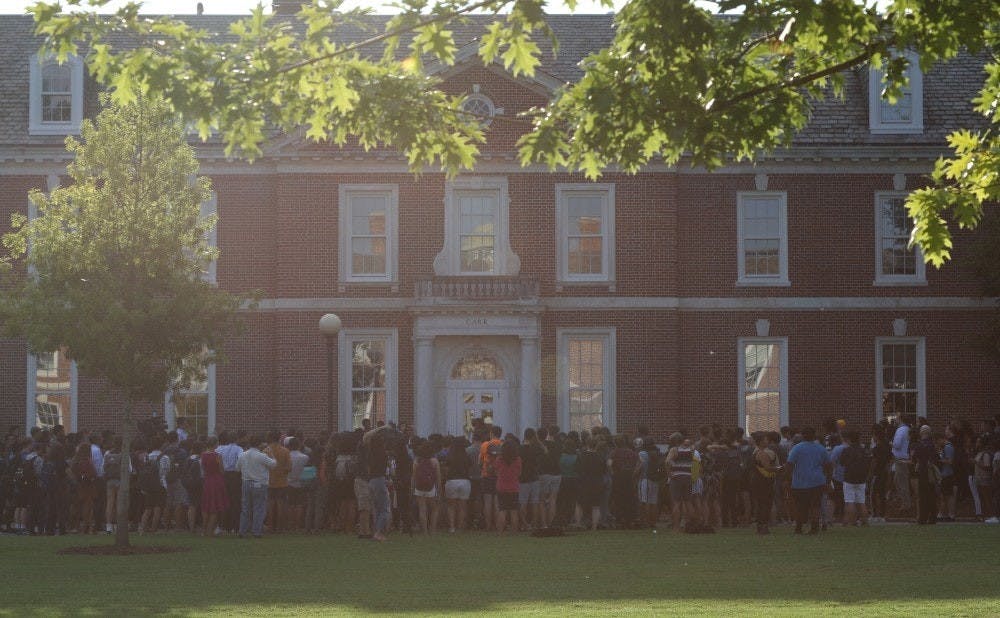“Whose University? Our University!"
A chant often employed by the People's State of the University during rallies, it intends to instill a sense of solidarity and ownership in participants. It is a message they attempt to send to administration and students alike.
“Ultimately this is for us and we want to be heard," senior and PSOTU member Hadeel Abdelhy said. "Part of protest culture is informing the people at the top about what the students are really experiencing."
Despite positive intentions to promote solidarity and engagement, protest culture is a topic that can become deeply divisive. Some students disagree with the approach of organizing protests or rallies, even if they may agree with their stance on an issue overall.
“It’s easy to think that [advocates] are just talking loudly here or talking loudly there... but it’s more than what people see externally,” senior and PSOTU member Shom Tiwari said. “These are students who have already been working in different capacities with the administration on these issues.”
Beyond the immediately visible, student activists spend time behind the scenes meeting with administrators and advocating for change from within. Rather than seeing protesting as the only method used to incite change, it becomes a tool for the movement. Demonstrations are often orchestrated as teach-ins for the education of others and to put pressure on the administration to remind them that the frequently used bureaucratic processes are slower than the pace of change needs to be.
“You can’t fully rely on the administration, as there is often a disconnect, and you can’t fully rely on protests since the administration are the ones with the power to enact change," said Abdelhy. "Each individual situation requires a different approach."
These approaches are well-thought-out strategies designed to tackle an issue in the manner they see the most effective. Some people questioned their method of advocacy when a group walked onto the stage during President Price’s speech during Alumni Weekend last year. Many of the alumni present turned their backs and even booed the protesters.
“It was shocking,” said sophomore Dani Schneider, a student intern who was working Alumni weekend. “I appreciated their cause and their right to voice their opinions, though I didn’t think their method was appropriate. So much emotion took over, and it was so aggressive, that it was almost counterproductive.”
Members of PSOTU saw this specific method of demonstration as an effective and relevant strategy. The date of Alumni Weekend marked the 50th anniversary of Martin Luther King’s assassination, and events were supposed to be held to commemorate student activism. However, some students saw this as a hypocritical move; they felt the administration was creating a false image of support for student activists to put on display for the alumni without actually following through.
“The university prioritizes relations with the alumni rather than the students’ well being,” said Tiwari.
In the wake of hate crimes and slow bureaucratic processes on campus, student activists found the administration's decision to hold events celebrating the impacts of activism despite the lack of tangible change inappropriate. It even gave some the impression that administrators placed the importance of alumni contributions and the overall perception of the university above the students’ mental health and physical safety.
Walking on during Price’s speech was intentionally disruptive to highlight the disconnect between the university's projection of their support for students and advocates, and what some students see as the reality of student activism on campus.
“Duke likes to celebrate student activists as long as they’re in history… in the distance. They don’t like to celebrate them when they’re present and here,” said Abdelhy.
However, not every method of activism is meant to be shocking. The recent rally at the Carr building was designed to be educational rather than disruptive. Faculty and speakers gathered alongside students to rally against racism on campus.
Beyond officially planned demonstrations and meetings with administrators, advocacy can exist in more informal settings.
“Policy change and social change are both critically important and depend on one another," said Tiwari.
Even if policy changes are implemented, forward progress is nearly impossible to achieve unless these changes are accepted socially as well. Discussing these issues in social settings can increase overall engagement and awareness, which is especially crucial on college campuses where students are often isolated from incidents that do not directly affect them.
“It’s important to remain socially aware even within the Duke bubble and remember there are real issues facing us beyond Duke’s campus,” said sophomore Hannah Rubin.
Although there is some push-back against student advocacy, there has been an increase in the number of students becoming activists in various capacities. While people may not see eye to eye on the methods of protesting used, student activists will continue to use various strategic means to enact tangible change on campus.
Get The Chronicle straight to your inbox
Sign up for our weekly newsletter. Cancel at any time.
“It’s normal to be scared of change, but there’s a difference between being open minded about it and trying to learn and being shut off,” said Abdelhy.

